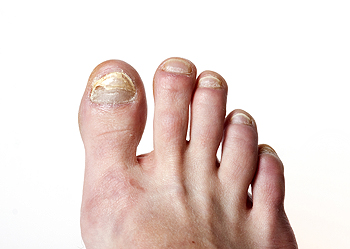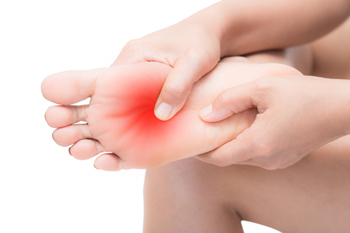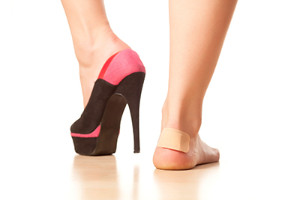Freehold (732) 294-9393
Freehold (732) 294-9393
 A fungal nail infection may become increasingly more painful if left untreated. This condition may make it uncomfortable to walk, wear shoes, or stand for long periods of time. To know if you have developed a toenail fungus, there are a few signs you should pay attention to and be on the lookout for. These indicators may include nail discoloration, white spots or streaks on the surface of the nail, thickening of the affected nail, and cracking or brittleness of the nail. The affected nail may also feel painful or tender to the touch. For a proper diagnosis and an advised treatment plan, it is suggested that you schedule an appointment with a podiatrist.
A fungal nail infection may become increasingly more painful if left untreated. This condition may make it uncomfortable to walk, wear shoes, or stand for long periods of time. To know if you have developed a toenail fungus, there are a few signs you should pay attention to and be on the lookout for. These indicators may include nail discoloration, white spots or streaks on the surface of the nail, thickening of the affected nail, and cracking or brittleness of the nail. The affected nail may also feel painful or tender to the touch. For a proper diagnosis and an advised treatment plan, it is suggested that you schedule an appointment with a podiatrist.
For more information about treatment, contact Dr. Henry Miller of New Jersey. Our doctor can provide the care you need to keep you pain-free and on your feet.
Toenail Fungus Treatment
Toenail fungus is a condition that affects many people and can be especially hard to get rid of. Fortunately, there are several methods to go about treating and avoiding it.
Antifungals & Deterrence
Oral antifungal medicine has been shown to be effective in many cases. It is important to consult with a podiatrist to determine the proper regiment for you, or potentially explore other options.
Applying foot powder on the feet and shoes helps keep the feet free of moisture and sweat.
Sandals or open toed shoes – Wearing these will allow air movement and help keep feet dry. They also expose your feet to light, which fungus cannot tolerate. Socks with moisture wicking material also help as well.
If you have any questions please feel free to contact our office located in Freehold, NJ . We offer the newest diagnostic tools and technology to treat your foot and ankle needs.
 The pain that is typically associated with Morton’s neuroma is felt in the ball of the foot. Many patients often describe it as a sharp, burning pain, and it may feel like there is a small stone in your shoe. This condition may develop from wearing shoes that are too tight, or from participating in high impact activities. Additionally, people who have foot conditions that can include bunions and hammertoes, or who are significantly overweight, may also experience Morton’s neuroma. This ailment is defined as growths that form around the nerves between the second and third toes, and when pressure is added, may cause pain and discomfort. A proper diagnosis generally consists of having an MRI taken, as this may be effective in identifying unwanted growths. If you are afflicted with Morton's neuroma, it is strongly suggested that you schedule a consultation with a podiatrist who can treat this condition.
The pain that is typically associated with Morton’s neuroma is felt in the ball of the foot. Many patients often describe it as a sharp, burning pain, and it may feel like there is a small stone in your shoe. This condition may develop from wearing shoes that are too tight, or from participating in high impact activities. Additionally, people who have foot conditions that can include bunions and hammertoes, or who are significantly overweight, may also experience Morton’s neuroma. This ailment is defined as growths that form around the nerves between the second and third toes, and when pressure is added, may cause pain and discomfort. A proper diagnosis generally consists of having an MRI taken, as this may be effective in identifying unwanted growths. If you are afflicted with Morton's neuroma, it is strongly suggested that you schedule a consultation with a podiatrist who can treat this condition.
Morton’s neuroma is a very uncomfortable condition to live with. If you think you have Morton’s neuroma, contact Dr. Henry Miller of New Jersey. Our doctor will attend to all of your foot care needs and answer any of your related questions.
Morton’s Neuroma
Morton's neuroma is a painful foot condition that commonly affects the areas between the second and third or third and fourth toe, although other areas of the foot are also susceptible. Morton’s neuroma is caused by an inflamed nerve in the foot that is being squeezed and aggravated by surrounding bones.
What Increases the Chances of Having Morton’s Neuroma?
Morton’s neuroma is a very treatable condition. Orthotics and shoe inserts can often be used to alleviate the pain on the forefront of the feet. In more severe cases, corticosteroids can also be prescribed. In order to figure out the best treatment for your neuroma, it’s recommended to seek the care of a podiatrist who can diagnose your condition and provide different treatment options.
If you have any questions, please feel free to contact our office located in Freehold, NJ . We offer the newest diagnostic and treatment technologies for all your foot care needs.
 The medical condition that is known as ingrown toenails can produce severe pain and discomfort. It is defined as the outer edges of the nail growing into the surrounding skin, and typically affects the big toe. It can occur as a result of wearing shoes that do not have adequate room for the toes to move freely in, or from improperly trimming the toenails. Additional reasons why this may happen can include excessively sweaty feet, also referred to as plantar hyperhidrosis, as well as genetic factors, or from a toe injury. Mild relief may be found when the affected toe is soaked in warm water, followed by using a piece of cotton to gently separate the nail from the skin. For more severe cases, it is strongly advised that you seek the counsel of a podiatrist who can properly treat ingrown toenails.
The medical condition that is known as ingrown toenails can produce severe pain and discomfort. It is defined as the outer edges of the nail growing into the surrounding skin, and typically affects the big toe. It can occur as a result of wearing shoes that do not have adequate room for the toes to move freely in, or from improperly trimming the toenails. Additional reasons why this may happen can include excessively sweaty feet, also referred to as plantar hyperhidrosis, as well as genetic factors, or from a toe injury. Mild relief may be found when the affected toe is soaked in warm water, followed by using a piece of cotton to gently separate the nail from the skin. For more severe cases, it is strongly advised that you seek the counsel of a podiatrist who can properly treat ingrown toenails.
Ingrown toenails may initially present themselves as a minor discomfort, but they may progress into an infection in the skin without proper treatment. For more information about ingrown toenails, contact Dr. Henry Miller of New Jersey. Our doctor can provide the care you need to keep you pain-free and on your feet.
Ingrown Toenails
Ingrown toenails are caused when the corner or side of a toenail grows into the soft flesh surrounding it. They often result in redness, swelling, pain, and in some cases, infection. This condition typically affects the big toe and may recur if it is not treated properly.
Causes
You are more likely to develop an ingrown toenail if you are obese, have diabetes, arthritis, or have any fungal infection in your nails. Additionally, people who have foot or toe deformities are at a higher risk of developing an ingrown toenail.
Symptoms
Some symptoms of ingrown toenails are redness, swelling, and pain. In rare cases, there may be a yellowish drainage coming from the nail.
Treatment
Ignoring an ingrown toenail can have serious complications. Infections of the nail border can progress to a deeper soft-tissue infection, which can then turn into a bone infection. You should always speak with your podiatrist if you suspect you have an ingrown toenail, especially if you have diabetes or poor circulation.
If you have any questions, please feel free to contact our office located in Freehold, NJ . We offer the newest diagnostic and treatment technologies for all your foot care needs.
 Many women enjoy wearing high heels. This type of shoe adds height to the body, and may help the legs and feet to appear slender. However, research has indicated there may be a price to pay from wearing high heels. If they are frequently worn, the feet may feel tired, which can affect your overall daily performance. Additionally, foot conditions can develop as well, including hammertoes and bunions. These conditions typically form as a result of having inadequate room for the toes to move freely in. Blisters and calluses can also gradually develop due to wearing high heels. It may help to alternate wearing high heels with a pair of flat shoes throughout the week, as this may prevent ingrown toenails from forming. If you would like more information about the effect high heels can have on the feet, please consult with a podiatrist.
Many women enjoy wearing high heels. This type of shoe adds height to the body, and may help the legs and feet to appear slender. However, research has indicated there may be a price to pay from wearing high heels. If they are frequently worn, the feet may feel tired, which can affect your overall daily performance. Additionally, foot conditions can develop as well, including hammertoes and bunions. These conditions typically form as a result of having inadequate room for the toes to move freely in. Blisters and calluses can also gradually develop due to wearing high heels. It may help to alternate wearing high heels with a pair of flat shoes throughout the week, as this may prevent ingrown toenails from forming. If you would like more information about the effect high heels can have on the feet, please consult with a podiatrist.
High heels have a history of causing foot and ankle problems. If you have any concerns about your feet or ankles, contact Dr. Henry Miller from New Jersey. Our doctor can provide the care you need to keep you pain-free and on your feet.
Effects of High Heels on the Feet
High heels are popular shoes among women because of their many styles and societal appeal. Despite this, high heels can still cause many health problems if worn too frequently.
Which Parts of My Body Will Be Affected by High Heels?
What Kinds of Foot Problems Can Develop from Wearing High Heels?
How Can I Still Wear High Heels and Maintain Foot Health?
If you want to wear high heeled shoes, make sure that you are not wearing them every day, as this will help prevent long term physical problems. Try wearing thicker heels as opposed to stilettos to distribute weight more evenly across the feet. Always make sure you are wearing the proper shoes for the right occasion, such as sneakers for exercising. If you walk to work, try carrying your heels with you and changing into them once you arrive at work. Adding inserts to your heels can help cushion your feet and absorb shock. Full foot inserts or metatarsal pads are available.
If you have any questions please feel free to contact our office located in Freehold, NJ . We offer the newest diagnostic and treatment technologies for all your foot and ankle needs.
Read more about Effect of High Heels on the Feet The medical condition that is known as cracked heels is defined as splits in the skin that may gradually develop into deep fissures. This may cause pain and discomfort, and in severe cases, the skin may begin to bleed. Common symptoms that are associated with this ailment can include hardened and itchy skin, and it may be difficult to walk. This condition may develop from standing for extended periods of time throughout the day, or from frequently wearing shoes that have an open back. Some patients have found mild relief when the feet are washed and dried, followed by using a good moisturizer. Additionally, it may be beneficial to drink plenty of water on a daily basis, and to implement a gentle exercise routine. If you are afflicted with cracked heels, it is strongly advised that you speak with a podiatrist who can properly treat this condition.
The medical condition that is known as cracked heels is defined as splits in the skin that may gradually develop into deep fissures. This may cause pain and discomfort, and in severe cases, the skin may begin to bleed. Common symptoms that are associated with this ailment can include hardened and itchy skin, and it may be difficult to walk. This condition may develop from standing for extended periods of time throughout the day, or from frequently wearing shoes that have an open back. Some patients have found mild relief when the feet are washed and dried, followed by using a good moisturizer. Additionally, it may be beneficial to drink plenty of water on a daily basis, and to implement a gentle exercise routine. If you are afflicted with cracked heels, it is strongly advised that you speak with a podiatrist who can properly treat this condition.
If the skin on your feet starts to crack, you may want to see a podiatrist to find treatment. If you have any concerns, contact Dr. Henry Miller from New Jersey. Our doctor can provide the care you need to keep you pain-free and on your feet.
Cracked Heels
It is important to moisturize your cracked heels in order to prevent pain, bleeding, and infection. The reason cracked heels form is because the skin on the foot is too dry to support the immense pressure placed on them. When the foot expands, the dry skin on the foot begins to split.
Ways to Help Heal Them
Ways to Prevent Cracked Heels
If you are unsure how to proceed in treating cracked heels, seek guidance from a podiatrist. Your doctor will help you with any questions or information you may need.
If you have any questions, please feel free to contact our office located in Freehold, NJ . We offer the newest diagnostic and treatment technologies for all your foot care needs.